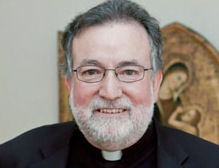Pro-Lifers Can’t Forget: It’s Our Duty to Protect the Elderly, Sick and Dying
by Sarah ZagorskiOn Friday morning, attendees of the National Right to Life Convention heard some of our Nation’s leading experts in the “Bioethics War on Humans” debate. They discussed ways to protect our elderly, terminally ill and sick, from a society that increasingly favors killing rather than curing sickness. The team of experts also elaborated on the ideologies that lead the charge in these discussions.
The first speaker, Wesley J. Smith, Ph.D, who is a renowned author, lawyer, and bioethicist, began by mentioning some key terms that we must become familiar with to understand the bioethics war on humans. Those who believe in killing rather than curing in America are often called, mercy killers, assisted suicide proponents, and right to die advocates. While some of these individuals genuinely believe they are alleviating suffering, the path they are leading us down have very damaging ramifications.
 Smith
reviewed medical proposals from Ivy League Universities, like Harvard,
which mention sick and dying patients donating their organs before being
declared medically dead. Smith said that while this has not occurred in
America, these proposals are not as uncommon as one might think. He
said that this is because our society is adopting ideologies similar to
that of secular philosopher, Peter Singer, who supports euthanasia,
abortion and assisted suicide.
Smith
reviewed medical proposals from Ivy League Universities, like Harvard,
which mention sick and dying patients donating their organs before being
declared medically dead. Smith said that while this has not occurred in
America, these proposals are not as uncommon as one might think. He
said that this is because our society is adopting ideologies similar to
that of secular philosopher, Peter Singer, who supports euthanasia,
abortion and assisted suicide.Another speaker during the session was Burke Balch, J.D., who is the Director of Robert Powell Center for Medical Ethics, the bioethics arm of National Right to Life. He dynamically began his talk by comparing two ancient Greeks. The first was Hypocrites of Cros, who is often referred to as the “father of modern medicine” and is known for coining the Hippocratic oath. For thousands and thousands of years, medical professionals took this sacred oath and promised to respect the dignity of every human being.
During the session, Balch quoted anthropologist, Margaret Mead, to describe the inception and the impact of this oath on society–
For the first time in our tradition there was a complete separation between killing and curing. Throughout the primitive world, the doctor and the sorcerer tended to be the same person. He with power to kill had power to cure, including specially the undoing of his own killing activities. … With the Greeks, the distinction was made clear. One profession, the followers of Asclepius, were to be dedicated completely to life under all circumstances, regardless of rank, age, or intellect – the life of a slave, the life of the Emperor, the life of a foreign man, the life of a defective child. . . This is a priceless possession which we cannot afford to tarnish, but society always is attempting to make the physician into a killer – to kill the defective child at birth, to leave the sleeping pills beside the bed of the cancer patient. . . . It is the duty of society to protect the physician from such requests.
The second Greek scholar he mentioned was Plato, who many study for guidance in philosophy. However, some are unaware that in book three of Plato’s Republic, he writes this concerning good physicians:
“They will minster to better natures, giving help to both soul and body. But those who are diseased in their body they will leave to die, and the corrupt and incurable souls they will put an end to themselves.
The dramatic differences between these two ethics are what we see warring in our nation today. Balch elaborated by saying that the frightening thing about our society is that in the medical schools across America, doctors are no longer taking the Hippocratic oath, nor are they told to ask the question, “how to treat”, but instead, “whether to treat”. America is teaching their physicians to consider the cost of the treatment first, and whether the money is worth the life of their patient. This is putting medical professionals in a place where they are told that making ‘quality of life’ judgments is their job.
During the session, Balch said that while there are fundamental differences between the views and practices of the death advocates that exist now in the medical profession, and the ones that dominated Europe seventy-five years ago during the Holocaust, their quality of life ethic is the same.
He said it is critical that we understand that the actual application of their ethic is extremely subjective and very arbitrary. Balch argued that this is because humanity exists on a continuum of our degree of mental mobility, and on a continuum of physical health. The issue of where you draw the line of whether a particular persons life if worth living, or a particular life is not worth living, is something of a gut instinct or of a consensus among doctors.
Lastly, Balch discussed how Obamacare is forcing physicians and health care providers to ration health-care. This is why many are leaving the health profession. Some doctor’s are uncomfortable deciding who receives treatment and who doesn’t, while others are arrogantly making God-like decisions.
Balch emphasized that ultimately Obamacare is designed to prevent us from using our own money to help our sick and dying loved ones. He closed his sobering message by reiterating how important our obligation is to our families to protect and guard them from all of the evil lurking within our own nation.
Source: LifeSite News











 Good news—indeed, great news—is always welcomed, even if we learn about it after the fact.
Good news—indeed, great news—is always welcomed, even if we learn about it after the fact. Reproductive
Research Audit covers studies that address the most controversial
topics in reproductive health research, including the long-disputed (but
recently affirmed) link between induced abortion and preterm birth, the
contested link between induced abortion and breast cancer (ABC link),
and the suppression of studies that suggest abortion may contribute to
problems in mental health. RRA covers these topics not just in spite of
widespread hostility toward researchers and suppression of these
findings, but due to the fact that such persecution and censorship is
contrary to standards of scientific discourse and intellectual honesty.
Reproductive
Research Audit covers studies that address the most controversial
topics in reproductive health research, including the long-disputed (but
recently affirmed) link between induced abortion and preterm birth, the
contested link between induced abortion and breast cancer (ABC link),
and the suppression of studies that suggest abortion may contribute to
problems in mental health. RRA covers these topics not just in spite of
widespread hostility toward researchers and suppression of these
findings, but due to the fact that such persecution and censorship is
contrary to standards of scientific discourse and intellectual honesty.

 Never
in my experience have I ever encountered a better example of what
Natalie Gross of the Lubbock Avalanche Journal calls “repurposing.”
Never
in my experience have I ever encountered a better example of what
Natalie Gross of the Lubbock Avalanche Journal calls “repurposing.”






